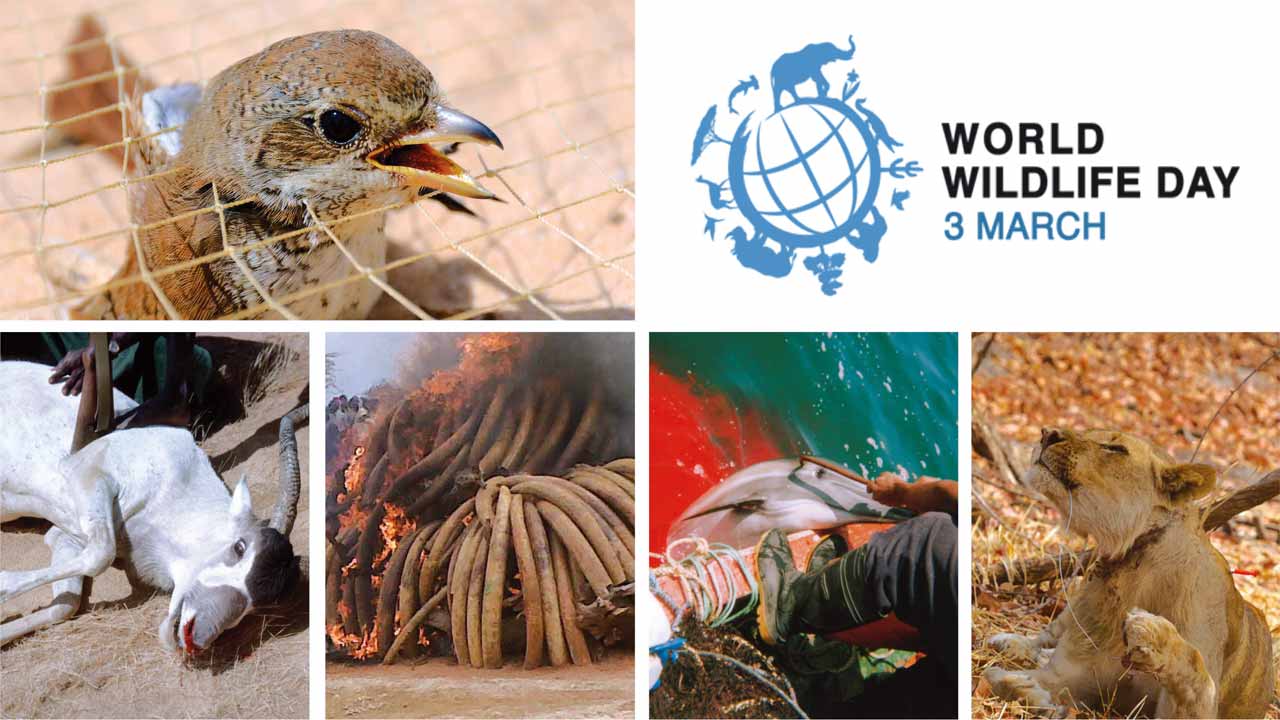
World Wildlife Day is observed on 3rd March 2017. This year’s theme is “Listen to the Young Voices”. According to the United Nations, almost one quarter of the world’s population is aged between 10 and 24, therefore vigorous efforts need to be made to encourage young people, as the future leaders and decision makers of the world, to act at both local and global levels to protect endangered wildlife. The young voices of Mauritius express their opinions on the issue.
 Rishna Prayag: “Small steps can bring significant change”
Rishna Prayag: “Small steps can bring significant change”
Human survival strongly depends on wildlife, argues Rishna. “Humans have been exploiting so much that today, we talk about over-exploitation. The clothes we wear, the food we eat, the houses we live in, the paper we are reading or the medicine we take are all directly or indirectly products from our natural resources. Over-exploitation has led to an imbalance in our eco system, therefore also disturbing humans.
Thousands of animals are killed every year due to human activities. From planktons to whales, from ants to elephants, from plants to humans-every life form is touched. Habitat loss, pollution, floods and droughts are all connected to climate change. Today, even our economy depends on our wildlife, as Mauritius is a tourist destination.”
She believes that small steps or choices taken wisely everyday will produce significant results. We should get involved and try to protect our wildlife. Be it by planting trees, saving endemic animals/plants, producing less waste, using the bins, saving energy or donating and supporting NGOs such as the Mauritian Wildlife Foundation or local shelters.”
 Nethy Chunwan: “Educating the young generations is a must”
Nethy Chunwan: “Educating the young generations is a must”
There are many measures which can be taken to protect wildlife; one of them is habitat restoration, says Nethy. “People must be sensitised on the importance of wildlife, especially the fauna which is very sensitive to habitat change. In Mauritius, we are sadly famous for the extinction of the Dodo. They were not only hunted, but also suffered from habitat loss due to deforestation. Forests help to build an ecosystem with the native fauna species. Forests are carbon dioxide filters and suppliers of oxygen. They are indicators of the health of the planet.
A mass destruction of the forests for economic development results in the climate change that we are experiencing nowadays. People have to reckon the importance of wildlife preservation. Therefore the action to be taken by the world to protect wildlife and restoring the habitat, is to unite and force the great economies and emerging ones to be more sustainable, for example, finding eco-friendly agricultural methods to produce food instead of burning down forests.”
Nethy had the opportunity to work for the Mauritian Wildlife Foundation (MWF). “During my two seasons there, I learned about the wealth of our local biodiversity. I worked mainly on the Echo Parakeet Release Project. The Echo Parakeets have been reintroduced in the Valley of Ferney since 2015. Previously they were restricted to the Black River Gorges National Park. Nowadays, I am contributing to the protection of wildlife through the Educational Project set up at the Ebony Forest Reserve, Chamarel.
I believe that educating the younger ones can help to raise awareness about the importance of wildlife protection. Respecting nature by not littering and avoid causing disturbance in the habitat of our native species are also very important. In Mauritius, it is sad to say that many people are not aware of the importance of wildlife and how to respect it. Why do we protect wildlife? A healthy native forest is a good indicator of the quality of air and soil and the native species within it contribute to the well-being of the forest.”

 Sandrine Ishimwe: “We can make a difference by learning”
Sandrine Ishimwe: “We can make a difference by learning”
A recent study estimates the extinction rate of wild life to have increased 100 times in the past century, says Sandrine. “This is interesting because more and more wildlife conservation initiatives have been created in the few past decades to protect wildlife (fauna and flora), yet this has done little to reduce the rate at which endangered species are threatened or become extinct, plants and animals alike.
Could it be that we shift our responsibilities as individuals in protecting wildlife to these institutions or businesses as part of their social responsibilities? It is easy to overlook the impact our individual daily activities have on Mother Nature, especially when they seem so harmless and insignificant like trashing a plastic bottle on the beach or cutting down a tree in the forest. I mean, there are a thousand more trees left, right?”
She further adds that “we can make a difference by learning the beauty and value of wildlife as well as being consciously mindful of our daily activities that pose harm to our wildlife and their habitat; first as individuals, then as ethical citizens of the world. We need to make deliberate efforts to protect and preserve wildlife.”
 Asliyah Meeajan: “Think before you act”
Asliyah Meeajan: “Think before you act”
Asliyah states that people suffer around the world. “We have to protect life. We are part of an ecosystem and both animals and plants have a role to play in this ecosystem. We tend to believe that we are superior to animals because we are intelligent. But intelligence also implies responsibilities. Now imagine a world with no trees, no animals, and no life. We live in a world so bounded by technology that we do not see those suffering. The world is beautiful and there’s so much still hidden from our eyes.”
She is completely against the use of killing animals for human pleasure. “Simple actions can save wildlife. It is now time to act upon. Think before you act. This might save lives.”

 Message of John E. Scanlon, Secretary-General of CITES
Message of John E. Scanlon, Secretary-General of CITES
World Wildlife Day is a very special day on the United Nations calendar. It raises awareness of wildlife conservation and it helps to galvanize national and international action. It is today the world’s most important global annual event dedicated to wildlife.
The theme for this year - ‘Listen to the Young Voices’, aims to inspire young people around the world to actively participate in wildlife conservation efforts. Our generation has not yet succeeded in securing the future of many wild animals and plants. Meeting this challenge will now be shared with the next generation.
And to succeed we must fully harness the innovation and energy of youth, and combine it with the wisdom that comes with experience, if we are to make the change we need to see happen. It is the obligation of the current generation to share their knowledge of wildlife conservation with the younger generations, whilst also empowering and encouraging them to actively engage and participate in creative ways.
Investment in our young people will ensure the continued survival of wild animals and plants and help us in the fight against the devastating illicit trade in wildlife.
This year’s theme also comes alongside other strident efforts to encourage youth contribution, such as the work of the UN Secretary General’s Envoy on Youth and the first ever CITES Resolution on youth engagement, which was adopted at the 17th meeting of the Conference of the Parties to CITES held in Johannesburg last year. It makes a strong call for the engagement and empowerment of the youth in issues of wildlife conservation.
We have already begun to see the integration of young voices into wildlife conservation issues through the Youth Forum for People and Wildlife in the lead-up to CITES CoP17 and South Africa`s Youth and Conservation Programme – both of which were a great success.
World Wildlife Day 2017 gives us the opportunity to generate enthusiasm for wildlife conservation amongst younger generations, and to provide platforms for them to engage with one another on conservation issues. I encourage youth around the world to take a personal interest in wildlife conservation and to help fight wildlife crimes. Let your voice be heard on the safeguarding of wild animals and plants!
Working across generations for wildlife conservation is in everyone’s interest – and it will benefit economies and people as well as wild animals and plants. It’s time for all of us to listen to the young voices!
John E. Scanlon, Secretary-General of CITES








